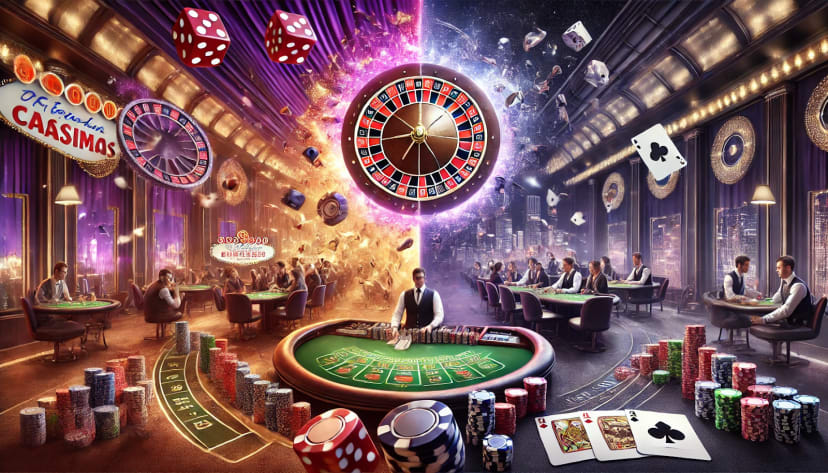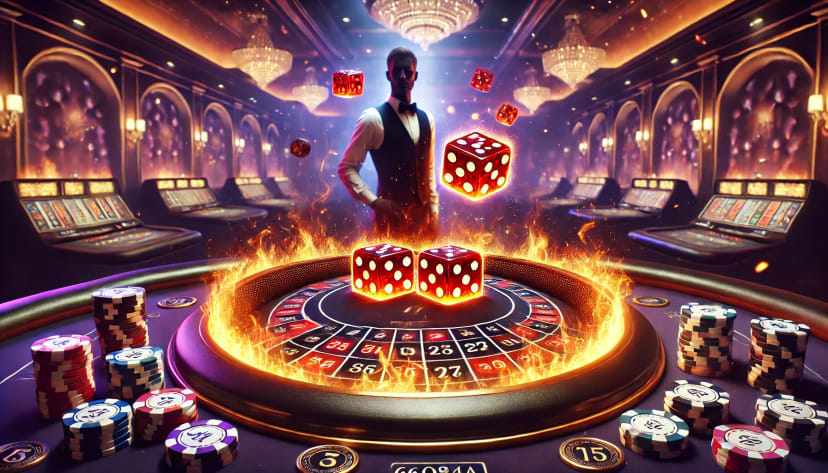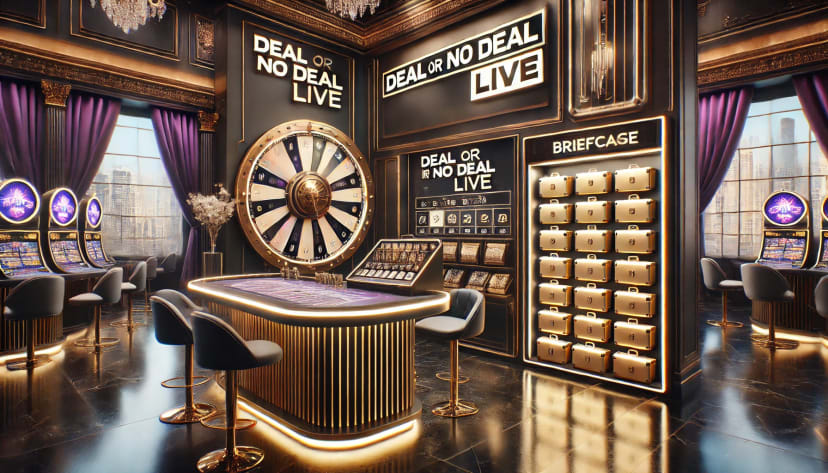Are Live Casino Games Threatening the Existence of RNG Games?

The online gambling scene in Ireland has seen a massive transformation over the last ten years. What started as a digital version of your favourite pub fruit machine or casino game, driven by random number generators (RNG), has evolved into slick live-streamed games with real dealers and actual equipment. This isn't just about new tech; it's a big shift in how we play online, and it makes you wonder about the future of those good old RNG games that have been the bedrock of online casinos since they began.
From RNG to Live Action: A Casino Evolution
The journey from basic RNG games to today's immersive live casino experiences has been a technological marvel. Live dealer games first popped up around 2003, but they were clunky, hampered by slow internet speeds and basic streaming tech. The picture was often choppy, low-resolution, and prone to cutting out.
Here's a look at the key milestones:
- 2003-2006: Early live dealer games arrive, typically with simple single camera setups.
- 2007-2010: Multi-camera systems become common, offering a better view of the action.
- 2011-2014: HD streaming becomes the standard as internet speeds catch up.
- 2015-2018: Mobile optimisation makes these games accessible on the go.
- 2019-2022: Game show formats burst onto the scene, mixing live hosting with casino action.
- 2023-2025: Augmented and Virtual Reality (AR/VR) integration begins, hinting at truly hybrid experiences.
This has turned what was once a niche side-bet into a major player in the online gambling world. Today's live casino studios look like professional TV sets, with multiple cameras and interactive features that were unthinkable back in the day.
Why This Matters in Ireland Right Now
The question of whether live casino games are taking over from RNG games is a big one for the Irish gambling industry in 2025. Market trends show that the live dealer section is growing by about 15% annually, compared to 7% for traditional RNG games. Many of the big operators in Ireland are now putting up to 40% of their marketing budget into live casino promotions. This clearly shows a strategic shift towards these more engaging offerings.
Player preferences in Ireland have also changed quite a bit. Recent surveys suggest:
- 62% of players under 35 prefer live dealer games.
- Players spend 2.3 times longer in live dealer sessions.
- Average bets are 30% higher in live dealer games compared to their RNG counterparts.
These figures mean operators are rethinking their game selections and how they allocate resources. For game developers and tech providers, this influences what they focus on in R&D. Regulators also face new challenges in ensuring fair play and responsible gambling measures are in place for these evolving formats.
How Irish Players Are Engaging: Experience Matters
The Human Touch: Why Live Dealers Keep Players Hooked
Live casino games have totally changed how players get involved, thanks to real people and genuine casino vibes. You can have the craic with dealers and other players, adding a social element that was missing from online gambling. This really tackles one of the biggest complaints about playing online – that it can feel isolating compared to a trip to a physical casino.
Seeing actual cards being dealt or a roulette wheel spin has a huge psychological effect. Studies show that Irish players trust live games more than RNG versions. In fact, 74% of surveyed players feel live games are fairer, even though both types undergo strict testing. This trust leads to longer gaming sessions and better player loyalty.
Live dealer providers have really upped their game with dealer training. Dealers are now coached not just on rules but on how to engage players, building personalities and even small fan followings among regulars.
RNG Games: Still Top for Convenience and Control
Even with the rise of live casinos, RNG games in Ireland still offer big pluses for convenience and control. These games are available 24/7 with no waiting for a seat or a dealer. You can play your favourite games whenever you fancy, and the pace is entirely up to you – a huge draw for many players.
RNG games also shine in these areas for Irish players:
- Privacy and anonymity for those who prefer a more solitary gaming experience.
- Much faster gameplay – no waiting for the dealer or other players.
- Lower minimum betting limits, making them more accessible to casual players
- Perfect for mobile play in situations with unstable internet connections
- Ability to play in practice mode before committing real money
These factors ensure that RNG games maintain a dedicated player base even as live casino options expand. For many players, particularly those seeking quick gaming sessions during commutes or breaks, the immediacy of RNG games remains compelling.
Game Design and Innovation Cycles
How Live Games Are Evolving Faster
The innovation pace within live casino formats has accelerated dramatically, outpacing traditional RNG development cycles. Game show hybrids like "Crazy Time" and "Monopoly Live" have created entirely new categories that blend gambling with entertainment elements reminiscent of television game shows.
These innovations extend beyond mere visual enhancements to include:
- Multiplier mechanics that dramatically increase potential payouts
- Bonus rounds requiring player decisions and interaction
- Augmented reality elements overlaid on physical game components
- Multi-game environments where players can participate in several games simultaneously
- Seasonal and themed limited-time versions of popular games
The production value of these offerings continues to increase, with Evolution Gaming's "Gonzo's Treasure Hunt Live" representing one of the first successful mergers of a popular RNG slot character with a live dealer format. This cross-pollination suggests that the boundaries between live and RNG games may become increasingly blurred.
Are RNG Games Stagnating or Adapting?
Contrary to assumptions that RNG games are stagnating, significant innovation continues in this space, albeit in different directions. The transition to HTML5 technology has revitalized older titles, making them compatible with modern devices and introducing new features impossible in earlier formats.
RNG innovation has focused on these areas:
| Innovation Area | Examples | Player Impact |
|---|---|---|
| Mechanics | Megaways, Cluster Pays, Infinity Reels | New ways to win beyond traditional paylines |
| Volatility Options | Player-selectable variance levels | Customized risk/reward profiles |
| Narrative Elements | Story progression, character development | Deeper player investment in game outcomes |
| Social Features | Tournaments, leaderboards, shared bonus rounds | Community engagement without direct interaction |
| Cross-platform Integration | Synchronized progress across devices | Seamless play transitions from desktop to mobile |
These developments demonstrate that RNG games are not standing still but evolving along a parallel track that emphasizes different player preferences and technological capabilities. The question remains whether these innovations can sustain player interest against the backdrop of increasingly sophisticated live offerings.
Platform and Operator Economics
Revenue Generation Per Player
The economic realities of live dealer versus RNG games present operators with complex considerations. Live dealer games generate significantly higher revenue per player, with average session values 2.7 times higher than comparable RNG alternatives. This revenue advantage stems from multiple factors including longer engagement times, higher minimum bets, and the psychological impact of social pressure when playing with real dealers and other participants.
Time-on-site metrics show particular divergence:
- Average RNG slot session: 18 minutes
- Average RNG table game session: 22 minutes
- Average live dealer session: 52 minutes
This extended engagement translates directly to higher revenue, with players making more bets over longer periods. Additionally, the immersive nature of live dealer games reduces the likelihood of players multi-tabling or splitting attention across multiple sites, keeping them focused on a single operator's offerings.
Cost to Host and Maintain
While live dealer games generate higher revenue per player, they also incur substantially higher operational costs. Maintaining live dealer studios requires:
- Physical studio space with sophisticated lighting and acoustics
- Broadcasting equipment and high-bandwidth streaming infrastructure
- Trained dealers working in shifts to provide 24/7 coverage
- Technical support staff to address real-time issues
- Game equipment maintenance and replacement
These expenses create a higher break-even threshold for live dealer games. In contrast, RNG games offer nearly unlimited scalability—once developed, they can serve millions of players simultaneously with minimal additional infrastructure costs. This scalability makes RNG games particularly valuable for smaller operators or those entering new markets where player volumes may initially be low.
Regulatory and Licensing Considerations
RNG Compliance and Certification
RNG games operate under well-established regulatory frameworks that have evolved over decades. These games undergo rigorous mathematical testing by independent laboratories like Gaming Laboratories International (GLI) and iTech Labs to verify randomness and expected return-to-player percentages.
The certification process typically involves:
- Source code reviews to identify potential vulnerabilities
- Statistical analysis of millions of simulated game outcomes
- Periodic retesting to ensure ongoing compliance
- Verification of game rules and paytable accuracy
This established framework provides regulatory clarity for operators and confidence for players. The mathematical nature of RNG testing also allows for precise calculation of house edges and volatility profiles, giving players transparent information about game characteristics.
Live Game Audits and Oversight
Live dealer games present unique regulatory challenges that have required adaptation of existing frameworks. Rather than focusing exclusively on random number generation, regulators must consider the integrity of physical equipment, dealer training, and real-time monitoring systems.
Regulatory approaches have evolved to include:
- Camera systems that monitor all dealer actions
- Automated card recognition technology to verify hand outcomes
- Regular physical inspection of equipment like roulette wheels and card shoes
- Dealer training certification and ongoing performance monitoring
- Incident response protocols for disputes or technical failures
These measures add complexity to compliance efforts but have proven effective in maintaining game integrity. Regulators in major jurisdictions now have specialized divisions focused on live dealer oversight, reflecting the growing importance of this segment.
Conclusion: Will RNG Games Survive the Live Casino Boom?
The evidence suggests that the future of online gambling will feature both live and RNG formats evolving in parallel rather than one replacing the other. The question is less about survival and more about adaptation and specialization. RNG games are likely to continue evolving toward experiences that capitalize on their unique strengths—privacy, pace control, complex mathematics, and unlimited scalability.
For players, this parallel evolution promises richer and more diverse gambling experiences. For operators, it necessitates sophisticated multi-product strategies rather than all-or-nothing bets on either format. The question is not whether RNG games will survive, but how both formats will transform as they respond to evolving player expectations and technological capabilities.
FAQ
What are Live Casino Games and How Do They Differ from RNG Games?
Live casino games use real dealers, physical cards, and live-streaming technology to recreate the buzz of a traditional Irish casino online. RNG (Random Number Generator) games, on the other hand, use computer algorithms to determine outcomes. Live games offer a more immersive and social experience, while RNG games are quicker, more private, and offer greater flexibility.
Are Live Casino Games Replacing RNG Games in Ireland?
No, live casino games aren't replacing RNG games, but they are becoming increasingly popular. Live games offer a realistic and interactive experience, but RNG games remain popular due to their convenience, speed, and suitability for playing on your mobile. Both types of games are constantly evolving to cater to different player preferences.
Why Do Players in Ireland Prefer Live Casino Games?
Irish players often prefer live casino games because they offer increased trust, realism, and social interaction. Seeing a real dealer and physical cards can increase confidence in the fairness of the game. The interactive nature of live games also enhances engagement, leading to longer play sessions. Remember to gamble responsibly and set limits.
How Are RNG Games Adapting to Stay Competitive in the Irish Market?
RNG games are evolving with innovative features like Megaways and Cluster Pays, customisable volatility, engaging storylines, and social elements such as tournaments and leaderboards. Upgrades to HTML5 and cross-device compatibility ensure a modern and flexible gaming experience that appeals to tech-savvy Irish players.
What Are the Financial and Operational Differences Between Live and RNG Games for Casino Operators?
Live games tend to generate more revenue per player due to higher engagement and larger bets, but they also have higher operational costs related to staffing, studio space, and streaming technology. RNG games, on the other hand, offer lower operational costs and are highly scalable, making them a good option for operators with limited resources or those targeting a broader audience.
















